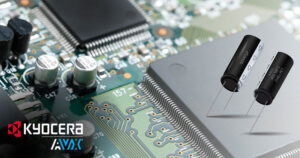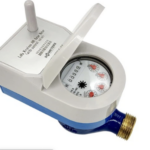 KYOCERA AVX released the new RES Series radial-leaded aluminum electrolytic capacitors.
KYOCERA AVX released the new RES Series radial-leaded aluminum electrolytic capacitors.The new RES Series wet aluminum electrolytic capacitors are engineered to deliver high CV values in small case sizes, long-lifetime endurance of 5,000–7,000 hours at 105°C, and high ripple current to help manufacturers save board space in high-density PCB assemblies without compromising on endurance. They are also lead-free compatible and compliant with the RoHS, REACH, and CA Prop 65 directives, enabling broad suitability in industrial, communications, and consumer electronics applications, including computers, access points, and other networking stations compatible with the 802.11 protocol.
The series is currently available in five case sizes (0511, 0611, 0812, 0816, and 0820) with diameters spanning 5.00–8.00mm, lengths spanning 11.00–20.00mm, and weights extending from just 0.41–1.81g. The initial release also offers four voltage ratings (16, 25, 35, and 50V) and capacitance values extending from 2.2–1,000µF (±20%), exhibits ripple currents spanning 190–1,400HmArms and withstands operating temperatures extending from -40°C to +105°C.
The RES Series is the eighth series to join the extensive radial-leaded aluminum electrolytic capacitors portfolio that KYOCERA AVX released in February 2022. That portfolio now offers four lines of wet aluminum electrolytic capacitors (the RES, REA, REF, and REH Series), two lines of conductive polymer aluminum electrolytic capacitors (the RPA and RPF Series), and two lines of hybrid aluminum electrolytic capacitors (the RHA and RHD Series), as well as an even wider variety of part numbers available with commercial and industrial reliability levels and competitive pricing and lead times.
The new RES Series radial-leaded aluminum electrolytic capacitors are shipped in bulk packaging, and the lead time for the series is currently 20–24 weeks.
You may also like:
Filed Under: Consumer Electronics, Industrial, News, PCB design, Products, Telecommunications







Questions related to this article?
👉Ask and discuss on EDAboard.com and Electro-Tech-Online.com forums.
Tell Us What You Think!!
You must be logged in to post a comment.